Text
“BLAKE WROTE the Marriage of Heaven and Hell. If I have written of their Divorce, this is not because I think myself a fit antagonist for so great a genius, nor even because I feel at all sure that I know what he meant. But in some sense or other the attempt to make that marriage is perennial.
The attempt is based on the belief that reality never presents us with an absolutely unavoidable "either-or"; that, granted skill and patience and (above all) time enough, some way of embracing both alternatives can always be found; that mere development or adjustment or refinement will somehow turn evil into good without our being called on for a final and total rejection of anything we should like to retain.
This belief I take to be a disastrous error. You cannot take all luggage with you on all journeys; on one journey even your right hand and your right eye may be among the things you have to leave behind.
We are not living in a world where all roads are radii of a circle and where all, if followed long enough, will therefore draw gradually nearer and finally meet at the centre: rather in a world where every road, after a few miles, forks into two, and each of those into two again, and at each fork you must make a decision.
Even on the biological level life is not like a pool but like a tree. It does not move towards unity but away from it and the creatures grow further apart as they increase in perfection. Good, as it ripens, becomes continually more different not only from evil but from other good.
I do not think that all who choose wrong roads perish; but their rescue consists in being put back on the right road. A wrong sum can be put right: but only by going back till you find the error and working it afresh from that point, never by simply going on.
Evil can be undone, but it cannot "develop" into good. Time does not heal it. The spell must be unwound, bit by bit, "with backward mutters of dissevering power"-or else not. It is still "either-or." If we insist on keeping Hell (or even earth) we shall not see Heaven: if we accept Heaven we shall not be able to retain even the smallest and most intimate souvenirs of Hell.
I believe, to be sure, that any man who reaches Heaven will find that what he abandoned (even in plucking out his right eye) was precisely nothing: that the kernel of what he was really seeking even in his most depraved wishes will be there, beyond expectation, waiting for him in "the High Countries."
In that sense it will be true for those who have completed the journey (and for no others) to say that good is everything and Heaven everywhere. But we, at this end of the road, must not try to anticipate that retrospective vision. If we do, we are likely to embrace the false and disastrous converse and fancy that everything is good and everywhere is Heaven.
But what, you ask, of earth? Earth, I think, will not be found by anyone to be in the end a very distinct place. I think earth, if chosen instead of Heaven, will turn out to have been, all along, only a region in Hell: and earth, if put second to Heaven, to have been from the beginning a part of Heaven itself.”
C.S. Lewis, preface to The Great Divorce
#cs lewis#the great divorce#heaven#hell#goodness#evil#life journey#human destiny#upstairs people#downstairs people#reality#literature#great books#books#Cambridge authors#inklings#preface#William Blake#eternity#time#english literature
0 notes
Text
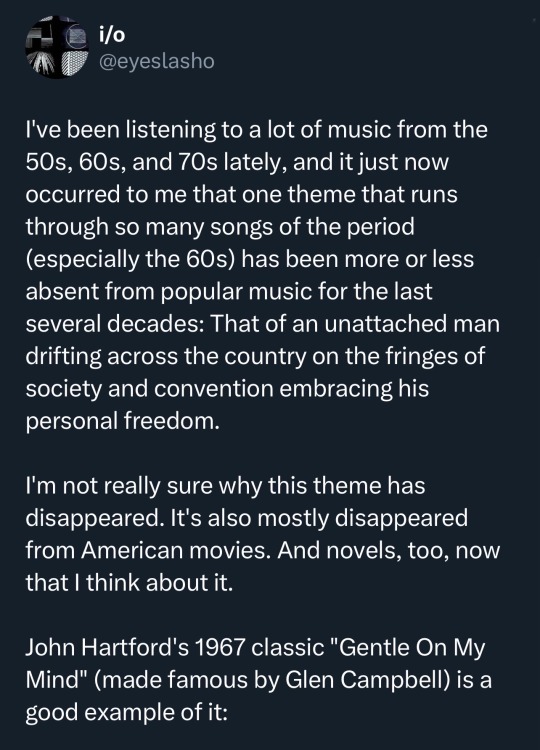


#music#homogeneity#cultural drought#time for reflection#wandering#seeking#personal adventure#courage to be#courage to explore#classic songs#rambling#ramble#personal journey#drifting#walkabout#consumer culture
10 notes
·
View notes
Text

“Government is a search for order, and for power only in so far as power is required by order.
It is present in the family, in the free associations of neighbours, and in the ‘little platoons’ extolled by Edmund Burke in his Reflections on the French Revolution and by Alexis de Tocqueville, in Democracy in America.
It is there in the first movement of affection and good will, from which the bonds of society grow. For it is simply the other side of freedom, and the thing that makes freedom possible.”
3 notes
·
View notes
Text
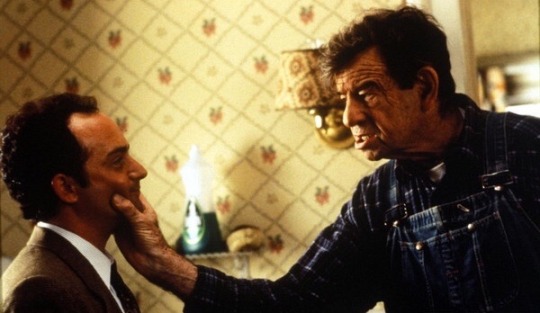
“When I met him on the set for the very first time…a couple of hours before we were going to shoot our first scene together, the director says (to Matthau) “this is Kevin Pollak, he’s going to play your son”, and I foolishly decided to make small talk with Walter Matthau, and I said, ‘So, Walter, uh, uh, the script’s pretty good huh?’, and he says, ‘the script sucks kid, I owe my bookie 2 million.’”
— Kevin Pollak, Grumpy Old Men (1993)
#walter matthau#kevin pollak#classic hollywood#hollywood story#gambling#bookies#lol#telling stories#grumpy old men#movies#1990s movies
5 notes
·
View notes
Text

#lol#hookerpenguins#the more you know#encouragement#penguins#strippers#hookers#funny#wildlife#having a hard day#be encouraged#animals#wild kingdom
5 notes
·
View notes
Text
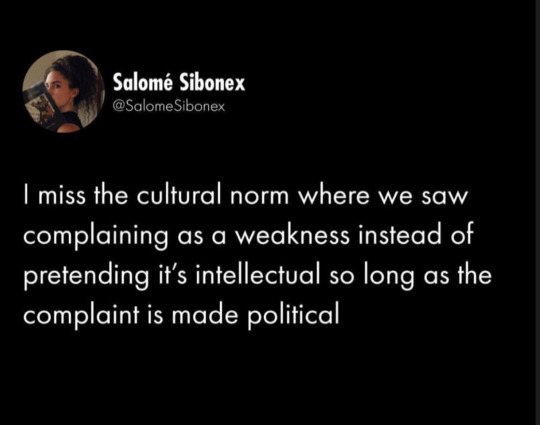
#fr tho#projection#politics is the opium of the asses#politics#complaining#making personal probs into causes#narrativespeak#evasion#denial#examine your own shit before blaming society#punkass route#psychobabble#life is hard#wacktivism#empty activism#activism#pseudo religion#localize your virtue#do real things#come correct#own your own bullshit#you are the cause#take responsibility#hiding behind issues#existential cowardice#culture#real talk#truth#weak#pseudo intellectualism
36 notes
·
View notes
Text

lol
3 notes
·
View notes
Text
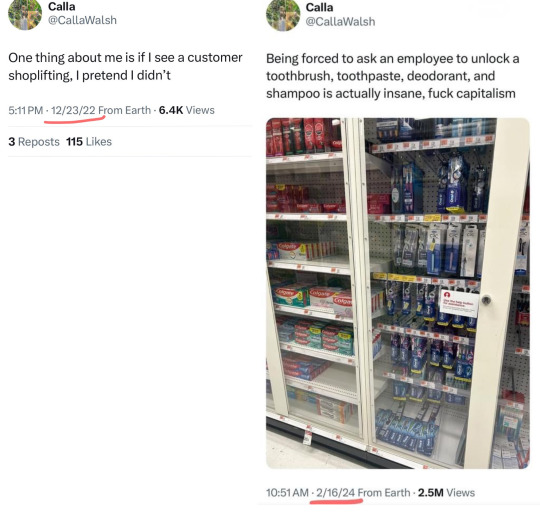
“𝐓𝐡𝐞𝐫𝐞'𝐬 𝐚𝐧 𝐞𝐩𝐢𝐝𝐞𝐦𝐢𝐜 𝐨𝐟 𝐩𝐞𝐨𝐩𝐥𝐞 𝐮𝐬𝐢𝐧𝐠 𝐭𝐡𝐞 𝐰𝐨𝐫𝐝 𝐜𝐚𝐩𝐢𝐭𝐚𝐥𝐢𝐬𝐦 𝐚𝐬 𝐚 𝐜𝐚𝐭𝐜𝐡-𝐚𝐥𝐥 𝐟𝐨𝐫 "𝐚𝐧𝐲𝐭𝐡𝐢𝐧𝐠 𝐈 𝐝𝐢𝐬𝐥𝐢𝐤𝐞 𝐢𝐧 𝐬𝐨𝐜𝐢𝐞𝐭𝐲."
𝐌𝐚𝐧𝐲 𝐨𝐟 𝐭𝐡𝐞𝐬𝐞 𝐩𝐞𝐨𝐩𝐥𝐞'𝐬 𝐥𝐢𝐯𝐞𝐬 𝐰𝐨𝐮𝐥𝐝 𝐢𝐦𝐩𝐫𝐨𝐯𝐞 𝐢𝐟 𝐭𝐡𝐞𝐲 𝐬𝐭𝐨𝐩𝐩𝐞𝐝 𝐫𝐞𝐥𝐲𝐢𝐧𝐠 𝐨𝐧 "𝐜𝐚𝐩𝐢𝐭𝐚𝐥𝐢𝐬𝐦" 𝐚𝐬 𝐚 𝐬𝐜𝐚𝐩𝐞𝐠𝐨𝐚𝐭 𝐭𝐨 𝐚𝐯𝐨𝐢𝐝 𝐮𝐧𝐝𝐞𝐫𝐬𝐭𝐚𝐧𝐝𝐢𝐧𝐠 𝐰𝐡𝐚𝐭 𝐭𝐡𝐞𝐲'𝐫𝐞 𝐚𝐜𝐭𝐮𝐚𝐥𝐥𝐲 𝐮𝐩𝐬𝐞𝐭 𝐚𝐛𝐨𝐮𝐭.”
— 𝐒𝐚𝐥𝐨𝐦é 𝐒𝐢𝐛𝐨𝐧𝐞𝐱
#shot -> chaser#luxury beliefs#ideologyspeak vs reality#in the abundance of water the fool is thirsty#cutting the branch you’re sitting and pontificating on#cause and effect#fucked up behavior vs isms#projectionism#money talks bullshit walks#release mental adolescence#capitalism#salomesibonex
25 notes
·
View notes
Text
“𝐓𝐡𝐞 𝐢𝐦𝐩𝐚𝐜𝐭 𝐨𝐟 𝐬𝐜𝐢𝐞𝐧𝐜𝐞 𝐨𝐧 𝐬𝐨𝐜𝐢𝐞𝐭𝐲 𝐰𝐢𝐥𝐥 𝐛𝐞 𝐚𝐛𝐥𝐞 𝐭𝐨 𝐩𝐞𝐫𝐬𝐮𝐚𝐝𝐞 𝐚𝐧𝐲𝐛𝐨𝐝𝐲 𝐨𝐟 𝐚𝐧𝐲𝐭𝐡𝐢𝐧𝐠 𝐢𝐟 𝐡𝐞 𝐜𝐚𝐧 𝐜𝐚𝐭𝐜𝐡 𝐭𝐡𝐞 𝐩𝐚𝐭𝐢𝐞𝐧𝐭 𝐲𝐨𝐮𝐧𝐠 𝐚𝐧𝐝 𝐢𝐬 𝐩𝐫𝐨𝐯𝐢𝐝𝐞𝐝 𝐛𝐲 𝐭𝐡𝐞 𝐒𝐭𝐚𝐭𝐞 𝐰𝐢𝐭𝐡 𝐦𝐨𝐧𝐞𝐲 𝐚𝐧𝐝 𝐞𝐪𝐮𝐢𝐩𝐦𝐞𝐧𝐭
Anaxagoras maintained that snow is black, but no one believed him. 𝐓𝐡𝐞 𝐬𝐨𝐜𝐢𝐚𝐥 𝐩𝐬𝐲𝐜𝐡𝐨𝐥𝐨𝐠𝐢𝐬𝐭𝐬 𝐨𝐟 𝐭𝐡𝐞 𝐟𝐮𝐭𝐮𝐫𝐞 𝐰𝐢𝐥𝐥 𝐡𝐚𝐯𝐞 𝐚 𝐧𝐮𝐦𝐛𝐞𝐫 𝐨𝐟 𝐜𝐥𝐚𝐬𝐬𝐞𝐬 𝐨𝐟 𝐬𝐜𝐡𝐨𝐨𝐥 𝐜𝐡𝐢𝐥𝐝𝐫𝐞𝐧 𝐨𝐧 𝐰𝐡𝐨𝐦 𝐭𝐡𝐞𝐲 𝐰𝐢𝐥𝐥 𝐭𝐫𝐲 𝐝𝐢𝐟𝐟𝐞𝐫𝐞𝐧𝐭 𝐦𝐞𝐭𝐡𝐨𝐝𝐬 𝐨𝐟 𝐩𝐫𝐨𝐝𝐮𝐜𝐢𝐧𝐠 𝐚𝐧 𝐮𝐧𝐬𝐡𝐚𝐤𝐚𝐛𝐥𝐞 𝐜𝐨𝐧𝐯𝐢𝐜𝐭𝐢𝐨𝐧 𝐭𝐡𝐚𝐭 𝐬𝐧𝐨𝐰 𝐢𝐬 𝐛𝐥𝐚𝐜𝐤.
Various results will soon be arrived at.
First, 𝐭𝐡𝐚𝐭 𝐭𝐡𝐞 𝐢𝐧𝐟𝐥𝐮𝐞𝐧𝐜𝐞 𝐨𝐟 𝐡𝐨𝐦𝐞 𝐢𝐬 𝐨𝐛𝐬𝐭𝐫𝐮𝐜𝐭𝐢𝐯𝐞.
Second, 𝐭𝐡𝐚𝐭 𝐧𝐨𝐭 𝐦𝐮𝐜𝐡 𝐜𝐚𝐧 𝐛𝐞 𝐝𝐨𝐧𝐞 𝐮𝐧𝐥𝐞𝐬𝐬 𝐢𝐧𝐝𝐨𝐜𝐭𝐫𝐢𝐧𝐚𝐭𝐢𝐨𝐧 𝐛𝐞𝐠𝐢𝐧𝐬 𝐛𝐞𝐟𝐨𝐫𝐞 𝐭𝐡𝐞 𝐚𝐠𝐞 𝐨𝐟 𝐭𝐞𝐧.
Third, that 𝐯𝐞𝐫𝐬𝐞𝐬 𝐬𝐞𝐭 𝐭𝐨 𝐦𝐮𝐬𝐢𝐜 𝐚𝐧𝐝 𝐫𝐞𝐩𝐞𝐚𝐭𝐞𝐝𝐥𝐲 𝐢𝐧𝐭𝐨𝐧𝐞𝐝 𝐚𝐫𝐞 𝐯𝐞𝐫𝐲 𝐞𝐟𝐟𝐞𝐜𝐭𝐢𝐯𝐞.
Fourth, 𝐭𝐡𝐚𝐭 𝐭𝐡𝐞 𝐨𝐩𝐢𝐧𝐢𝐨𝐧 𝐭𝐡𝐚𝐭 𝐬𝐧𝐨𝐰 𝐢𝐬 𝐰𝐡𝐢𝐭𝐞 𝐦𝐮𝐬𝐭 𝐛𝐞 𝐡𝐞𝐥𝐝 𝐭𝐨 𝐬𝐡𝐨𝐰 𝐚 𝐦𝐨𝐫𝐛𝐢𝐝 𝐭𝐚𝐬𝐭𝐞 𝐟𝐨𝐫 𝐞𝐜𝐜𝐞𝐧𝐭𝐫𝐢𝐜𝐢𝐭𝐲. (aka “crackpot conspirarcy theories”)
But I anticipate. It is for future scientists to make these maxims precise and discover exactly how much it costs per head to make children believe that snow is black, and how much less it would cost to make them believe it is dark gray.
Although this science will be diligently studied, 𝐢𝐭 𝐰𝐢𝐥𝐥 𝐛𝐞 𝐫𝐢𝐠𝐢𝐝𝐥𝐲 𝐜𝐨𝐧𝐟𝐢𝐧𝐞𝐝 𝐭𝐨 𝐭𝐡𝐞 𝐠𝐨𝐯𝐞𝐫𝐧𝐢𝐧𝐠 𝐜𝐥𝐚𝐬𝐬. 𝐓𝐡𝐞 𝐠𝐞𝐧𝐞𝐫𝐚𝐥 𝐩𝐨𝐩𝐮𝐥𝐚𝐜𝐞 𝐰𝐢𝐥𝐥 𝐧𝐨𝐭 𝐛𝐞 𝐚𝐥𝐥𝐨𝐰𝐞𝐝 𝐭𝐨 𝐤𝐧𝐨𝐰 𝐡𝐨𝐰 𝐢𝐭𝐬 𝐜𝐨𝐧𝐯𝐢𝐜𝐭𝐢𝐨𝐧𝐬 𝐰𝐞𝐫𝐞 𝐠𝐞𝐧𝐞𝐫𝐚𝐭𝐞𝐝.
When the technique has been perfected, every government that has been in charge of education for a generation will be able to control its subjects securely without the need of armies or policemen…
Some of these effects depend upon the political and economic character of the country concerned; others are inevitable, whatever this character may be.”
—Bertrand Russell
𝘐𝘮𝘱𝘢𝘤𝘵 𝘰𝘧 𝘚𝘤𝘪𝘦𝘯𝘤𝘦 𝘰𝘯 𝘚𝘰𝘤𝘪𝘦𝘵𝘺 (1954)
#bertrand russell#prophetic#the age of the big drain#society#it works#mindfuck#propaganda#current state#intellectual decline#manipulation#social engineering#opium of the asses#ideology#religion for parasites#utopianism#scientism#credentialism#striver class are easy pickings#professional managerial class#rent seeking apparatchiks#apparatchiks#education#trust in the experts#philosophers#mathematicians#science#politicization of science#social psychology
6 notes
·
View notes
Text
“The first thing to notice is that the student in the video pretends to be asking for the teacher's opinion but is in fact probing to find out if his teacher has the right opinion. That is, he's trying to find out if his teacher is part of "the people" or an "enemy of the people."
youtube
Bc of the power dynamic (the student is alone, particularly), he's unlikely to be able to initiate a struggle session, though he could deliver "criticism," in line with Mao Zedong Thought by accusing his teacher of being out of step with "the people's standpoint" on the issue.
His opener, though, where he pretends to be interested in the teacher's take or opinion is actually a test as to whether or not criticism needs to be delivered for having a wrong opinion. In other settings, it's the basis for shunning and even outright struggle sessions.
Struggle sessions were a form of psychosocial torture used by Maoist activists to humiliate and shame people who had the wrong opinions, trying to force them into conformity or into a process of thought reform ("ideological remolding"). Alternatively, it would just destroy them.
It's crucial to understand that this video opens with the student probing to find grounds to initiate criticism and struggle against the teacher. Had this gone differently, it's possible the teacher would face MANY students going after him later bringing vicious criticism.
You will find that with Maoist activism, the style is often to seem to probe what you think as a justification to rain opprobrium (struggle) down on you if you don't think what they want. It's very Hundred Flowers: let people speak so you can crush ideological enemies.
The Hundred Flowers Campaign (baihua qifang) was a time in the late 1950s when Mao encouraged free speech against his regime for a while then rounded up everyone who outed themselves as an "enemy" and sent them to be reeducated or die in the countryside (gulag).
The next thing to notice from the video is that the student hasn't formed his opinion about JK Rowling on the basis of any facts. It's what other people are saying. He's in the "outer circle" of the cult, like most people. He's locked in socially and emotionally ONLY.
You can tell this is the case for three reasons:
1) He presents it as such, lacking any substantive evidence;
2) He doesn't actually agree with the people's standpoint perfectly himself but defers to it;
3) He cannot articulate (intellectualize) WHY she's "transphobic."
If he were intellectually committed in addition to socially and emotionally locked ("inner school" of the cult), he would have been able to spout off any number of BS rationalizations for how Rowling is "transphobic" by stating the reality of sex. He can't, though.
This is important to recognize when it happens because people in the "outer school" of a cult are the most rescuable, as we see by the end of the video. They believe it because their social and emotional identities depend on it (so, hijacked psychosocial valuation schema).
A psychosocial valuation schema, by the way, is a method by which people evaluate themselves as good people (psycho-) or good members of a community (social). It's a fascinating subject, but Maoist "unity" through criticism and struggle (peer pressure) hijacks it, as seen here.
In short, the student is perceiving that if he has the wrong opinion about Rowling, he'll be a bad "community member" (ally), which means he's probably a bad person, worthy of shame, guilt, and exclusion, demanding he "do better." This dynamic is crucial to the cult brainwashing.
The teacher skillfully picks apart that this "outer school" cult member student doesn't know why he believes what he believes and forces him to think for himself, breaking him free from the Maoist psychosocial valuation schema for the duration of the exercise.
The next thing to observe is that the student later confesses to the fact that he personally sees nothing wrong with the statement but can see how others would find it problematic. That is, the psycho- part is breaking away from the -social part of the evaluation schema.
What he's expressing there is actually that he has adopted "the people's standpoint," as Mao called it. Wokes would call it "positionality" or "the standpoint of the oppressed" (yes, for those who know, "standpoint epistemology"). He knows he's supposed to see the world that way.
Psychologically for the student, this is the most dangerous and most important moment, and kudos to the teacher for effecting the deprogramming well. The reason is because the Maoist brainwashing program of "self-criticism" depends on the psycho- and -social being out of step.
The guilt and shame cycles in Maoist brainwashing, together with "leniency" or "love bombing" when people uphold the "people's standpoint" and criticism and struggle when they don't, are most powerful when the psycho- and -social parts disagree, not when they align.
The dynamic is to make the target feel like they're the only person who doubts "the people's standpoint." The student, in the wrong setting, would immediately feel alienated, alone, and ashamed that he knows "the people's standpoint" but secretly disagrees with it. This is key.
Maoism as a psychosocial brainwashing phenomenon requires "milieu control," such that the social group around you all publicly seems to perfectly hold to "the people's standpoint" so that each person believes they're the only one who thinks it's probably bogus.
In that state, you will "self-criticize" because you think something must be wrong with you. Indoctrination is external criticism. Conversion is self-criticism. Now note Robin DiAngelo saying "antiracism" is a lifelong commitment to self-reflection, self-critique, and activism.
In the end, the teacher breaks through, and the students sees not just that he was relying on "the people's standpoint" (psychosocial valuation) instead of his own critical thinking, and the teacher gives him space to feel accepting of "feeling like an idiot." That's very good.
In the Maoist environment, so with Woke teachers, the "people's standpoint" is pushed from the top, the interrogated "student" is urged to confess his sinful private doubts with increasing sincerity, and the social environment reinforces it all (to avoid their own struggle).
After breaking people down psychosocially this way and getting them to half-adopt and fully profess "the people's standpoint," the process enters another phase, xuexi, which means "study." That is, "outer school" cultists are pushed to become "inner school" cultists.
The point of "study" is to lead psychosocially locked people into intellectual rationalization, where the student would have been able to rattle off a litany of robotic-sounding theory (thought-terminating cliches and rationalizations) for how Rowling IS "transphobic."
That not only keeps them hermetically sealed (iykyk) in the cult, making deprogramming FAR harder and rarer, it also creates a demonstration for "outer school" members who can be convinced that their beliefs have intellectual foundations they just don't understand yet.”
- James Lindsay
#maoism#intellectual high jack#cult brainwashing#deprogramming#identity politics#authoritarian groupthink#critical thinking#ftw#release your mental adolescence#growth#fuck socially regressive ideology#fuck pseudo intellectualism#think for yourself#free yo mind and yo ass will follow#freedom#society#education#mala educacion#si se puede#gender ideology#pseudo community#communism#propaganda#james lindsay#Youtube#struggle sessions#we got a long way to go#the REAL resistance#how to escape brainwashing
15 notes
·
View notes
Text
“Like everything based on the writings of Karl Marx—seeing oppressors and colonial struggles everywhere—DEI was doomed to fail. The uniformity of thought known as intersectionality, fostered by DEI, meant all oppressed people must support all others who are oppressed. But that idea burst on Oct. 7 when Hamas raped, murdered and kidnapped Israelis. Many liberals, especially Jewish ones, couldn’t support genocidal “colonized” terrorists. Pop! The long march is in retreat.
By the way, ESG, or investing based on “environmental, social and governance” principles, peaked last June, when BlackRock CEO Larry Fink said he would stop using “the word ESG anymore, because it’s been entirely weaponized.” Never mind that performance of ESG funds has been sketchy and that BlackRock had been adding the label “sustainable” or “ESG” to funds and charging up to five times as much. Then a study published in December by Boston University’s Andrew Kingfound “no reliable evidence for the proposed link between sustainability and financial performance.” Pop!
Most offensive to me was DEI’s devious underlying agenda: societal design. 𝐁𝐥𝐢𝐧𝐝𝐞𝐝 𝐛𝐲 𝐟𝐚𝐧𝐚𝐭𝐢𝐜𝐚𝐥 𝐝𝐞𝐯𝐨𝐭𝐢𝐨𝐧, 𝐚𝐜𝐭𝐢𝐯𝐢𝐬𝐭𝐬 𝐰𝐞𝐫𝐞 𝐩𝐚𝐰𝐧𝐬 𝐟𝐨𝐫 𝐭𝐡𝐞 𝐜𝐚𝐮𝐬𝐞 𝐨𝐟 𝐫𝐞𝐬𝐡𝐚𝐩𝐢𝐧𝐠 𝐭𝐡𝐞 𝐰𝐨𝐫𝐥𝐝 𝐢𝐧𝐭𝐨 𝐚 𝐜𝐨𝐥𝐥𝐞𝐜𝐭𝐢𝐯𝐞 𝐮𝐭𝐨𝐩𝐢𝐚 𝐭𝐨 𝐛𝐞 𝐫𝐮𝐧, 𝐨𝐟 𝐜𝐨𝐮𝐫𝐬𝐞, 𝐛𝐲 𝐩𝐫𝐨𝐠𝐫𝐞𝐬𝐬𝐢𝐯𝐞, 𝐬𝐞𝐥𝐟-𝐢𝐝𝐞𝐧𝐭𝐢𝐟𝐲𝐢𝐧𝐠 𝐞𝐥𝐢𝐭𝐞𝐬. That was the “my truth” that Ms. Gay invoked on her exit. Critical theories and Marxist techniques would take power from you and me, using big government as the enforcer.
The new societal design, embedded in DEI and ESG, envisioned idyllic communal progress. 𝐇𝐢𝐬𝐭𝐨𝐫𝐲 𝐬𝐡𝐨𝐰𝐬 𝐭𝐡𝐢𝐬 𝐧𝐞𝐯𝐞𝐫 𝐰𝐨𝐫𝐤𝐬 𝐛𝐞𝐜𝐚𝐮𝐬𝐞 𝐩𝐨𝐰𝐞𝐫 𝐜𝐨𝐫𝐫𝐮𝐩𝐭𝐬. Diversity meant ideological conformity. Equity meant discrimination. Inclusion meant blurring the sexes. Men winning women’s athletic events would be considered normal. It was all theatrics, like the tampons I’ve seen in men’s bathrooms on Ivy League campuses. Somewhere George Orwell is rolling on the floor laughing.
One goal of progressive societal design is to shrink—depopulation. Twenty-somethings now question having children. Net zero and degrowth, both World Economic Forum approved, are pushed via energy myths: carbon bad, cows bad. A plant-based chicken in every pot and two electric cars in every garage. They envy the merit-touting rich, shout “inequality” and wear “Tax the Rich” dresses. They tear down statues to erase history. How did we let this happen?
𝐖𝐡𝐢𝐥𝐞 𝐌𝐚𝐫𝐱𝐢𝐬𝐦 𝐢𝐬 𝐚 𝐦𝐞𝐚𝐧𝐬 𝐨𝐟 𝐠𝐚𝐢𝐧𝐢𝐧𝐠 𝐩𝐨𝐰𝐞𝐫 𝐭𝐨 𝐢𝐦𝐩𝐥𝐞𝐦𝐞𝐧𝐭 𝐬𝐨𝐜𝐢𝐞𝐭𝐚𝐥 𝐝𝐞𝐬𝐢𝐠𝐧, 𝐢𝐭 𝐪𝐮𝐢𝐜𝐤𝐥𝐲 𝐭𝐮𝐫𝐧𝐬 𝐚𝐮𝐭𝐡𝐨𝐫𝐢𝐭𝐚𝐫𝐢𝐚𝐧. There was very little free speech at Harvard—the Foundation for Individual Rights and Expression ranked it last of all colleges last year. Those against the societal-design agenda were shouted down. Dissent was met with accusations of privilege or cancellation. Conform or be cast out. On a larger scale, the Biden administration co-opted social media to censure opposing views.
I, like most Americans, am for diversity, but not when it’s forced or mandated. In a 2017 interview, Mr. Fink admitted BlackRock would use DEI tactics to “force behaviors” of corporations on “gender or race,” including via management compensation. Now that’s power.
𝐓𝐡𝐢𝐬 𝐩𝐨𝐰𝐞𝐫 𝐢𝐧𝐞𝐯𝐢𝐭𝐚𝐛𝐥𝐲 𝐥𝐞𝐚𝐝𝐬 𝐭𝐨 𝐚 𝐦𝐚𝐫𝐜𝐡 𝐨𝐟 𝐢𝐧𝐭𝐞𝐥𝐥𝐞𝐜𝐭𝐮𝐚𝐥 𝐜𝐨𝐫𝐫𝐮𝐩𝐭𝐢𝐨𝐧 𝐭𝐡𝐫𝐨𝐮𝐠𝐡 𝐢𝐧𝐬𝐭𝐢𝐭𝐮𝐭𝐢𝐨𝐧𝐬, 𝐰𝐡𝐢𝐜𝐡 𝐰𝐞’𝐯𝐞 𝐬𝐞𝐞𝐧 𝐚𝐭 𝐇𝐚𝐫𝐯𝐚𝐫𝐝, 𝐭𝐡𝐞 𝐁𝐢𝐝𝐞𝐧 𝐚𝐝𝐦𝐢𝐧𝐢𝐬𝐭𝐫𝐚𝐭𝐢𝐨𝐧 𝐚𝐧𝐝 𝐞𝐥𝐬𝐞𝐰𝐡𝐞𝐫𝐞. Does national security adviser Jake Sullivan really care about equity or climate change? It polled well and put him back in power to implement his own societal design via “industrial strategy.”
𝐓𝐡𝐞 𝐠𝐨𝐨𝐝 𝐧𝐞𝐰𝐬 𝐢𝐬 𝐭𝐡𝐚𝐭 𝐞𝐜𝐨𝐧𝐨𝐦𝐢𝐜𝐬 𝐞𝐯𝐞𝐧𝐭𝐮𝐚𝐥𝐥𝐲 𝐨𝐮𝐭𝐥𝐚𝐬𝐭𝐬 𝐭𝐡𝐞 𝐜𝐨𝐧𝐭𝐫𝐨𝐥 𝐟𝐫𝐞𝐚𝐤𝐬. 𝐂𝐞𝐧𝐭𝐫𝐚𝐥 𝐩𝐥𝐚𝐧𝐧𝐢𝐧𝐠 𝐥𝐨𝐬𝐞𝐬. 𝐑𝐞𝐚𝐥 𝐥𝐢𝐟𝐞 𝐢𝐬 𝐚𝐛𝐨𝐮𝐭 𝐦𝐚𝐫𝐤𝐞𝐭𝐬 𝐭𝐡𝐚𝐭 𝐞𝐯𝐞𝐫𝐲 𝐝𝐚𝐲 𝐭𝐫𝐚𝐧𝐬𝐦𝐢𝐭 𝐭𝐫𝐢𝐥𝐥𝐢𝐨𝐧𝐬 𝐨𝐟 𝐩𝐫𝐢𝐜𝐞 𝐬𝐢𝐠𝐧𝐚𝐥𝐬 𝐨𝐟 𝐡𝐮𝐦𝐚𝐧 𝐝𝐞𝐬𝐢𝐫𝐞𝐬. Those prices inform production much better than any government bureaucrat or Harvard professor. Societal design—remember Lyndon B. Johnson’s Great Society?—requires government control. I’ll take freedom.
Preferred pronouns are fading. College admissions, and maybe hiring, based on race is illegal. DEI departments are being deconstructed. But while the DEI movement may have peaked, like that Monty Python character, it’s not dead yet. 𝐓𝐡𝐞 𝐟𝐞𝐯𝐞𝐫𝐢𝐬𝐡 𝐰𝐡𝐢𝐧𝐢𝐧𝐠 𝐨𝐟 𝐭𝐡𝐨𝐬𝐞 𝐠𝐫𝐚𝐬𝐩𝐢𝐧𝐠 𝐟𝐨𝐫 𝐭𝐡𝐞 𝐥𝐚𝐬𝐭 𝐫𝐞𝐢𝐧𝐬 𝐨𝐟 𝐩𝐨𝐰𝐞𝐫 𝐰𝐢𝐥𝐥 𝐩𝐫𝐨𝐛𝐚𝐛𝐥𝐲 𝐠𝐞𝐭 𝐰𝐨𝐫𝐬𝐞 𝐛𝐞𝐟𝐨𝐫𝐞 𝐃𝐄𝐈 𝐞𝐯𝐞𝐧𝐭𝐮𝐚𝐥𝐥𝐲 𝐝𝐢𝐞𝐬 𝐰𝐢𝐭𝐡 𝐚 𝐰𝐡𝐢𝐦𝐩𝐞𝐫.”
— Andy Kessler//WSJ
#wsj#thank god#dei must die#regressive ideology#luxury beliefs#striver class parroting of fashionable ideas that never work for working class and poor people#plantationeering 2.0#pseudo white guilt religion#society#Utopianism#elitism#Orwellian#Cadillac communism#equality NOT equity#reality wins#human nature#control#social engineering#emotionalism#wef#world economic forum#Andy Kessler#wall streeet journal#Marxism#apparatchiks#racism in virtuous looking clothing#pseudointellectualism#dehumanizing socially regressive mindfuck#diversity equity and inclusion#dei
23 notes
·
View notes
Audio
Classic. Remember dancing to this in the more musically eclectic clubs during the 1980’s. Nina & Danielle Dax were my crushes with their respective unique and seriously funky vibes..
Nina Hagen // Cosma Shiva
#nina hagen#cosma shiva#music#1980s club music#1980s#1980s music#classics#club classics#eclectic#danielle dax
376 notes
·
View notes
Text

Alexander Volkov (Russian/American, b.1960 in St. Petersburg, now lives in New Jersey)
"Evensong," 2019
Oil on canvas 30 x 48 in
196 notes
·
View notes
Photo

AT&T PicturePhone, Bell Lab (1969)
#prototypes#retro tech#tech#precursor#telephones#videophone#you kids had all the tech in the world#communications tech#at&t#phones
2K notes
·
View notes
Text
“It is his contention that liberal democracy contains within itself the seeds of its own decay—what Marxists would once have called its internal contradictions—because it is not moored to any substantive belief system, such as that which Christianity once supplied. Under what he calls hyperliberalism, the individual is left, and in fact is enjoined, to find his own identity and purpose, free of the barnacle-like accretions of intellectual, moral, and political history. The world for such individuals is an existential supermarket, in which nothing is received from the past, no possibilities are closed off, and no one has the right to interfere with anyone else’s choices. If today someone wants to be a man, tomorrow a woman, and the next day neither, so be it.
This is thin gruel, however, for a social animal endowed with self-consciousness. Man may desire to be free (whether this desire is inborn or the product of circumstance is beside the point, at least in the West), but he also desires to belong, for it is only by belonging that he can achieve some kind of transcendent purpose or find some transcendent meaning. The old group identities—religion, state, nation, class—have withered in the West under the relentless assault of supposedly rational criticism, but since group identity is an imperative need, new, more egotistical identities, highly balkanized, have taken their place, and are now engaged in a struggle for power.
Christianity once promised a better, indeed perfect, life in the hereafter, but once belief in the truth in its historical claims and doctrines began to waver, hopes for perfection moved from heaven to earth. Liberalism promised, if not perfection, at least constant progress toward it; but by also promising equality, not in the eyes of God, but here on earth, it opened the way to endless squabbles about what such equality meant, and to resentment when it was not achieved. My supposed right to equal respect is also my right to survey, censor, or suppress your thoughts—and vice versa. A state of paranoia results.
Liberalism is a doctrine of rights but, unsupported by any common cultural understanding in the population, it has become a kind of inflamed legalism, in which the law must adjudicate between, for example, the right to life of the conceptus, on the one hand, and the right of a woman to decide what goes on in her own body, on the other. Both rights, for those who uphold them, are absolute; no compromise is possible so long as the question is couched in these terms. Where the law adjudicates more and more in this way, it is not the legislature (which cannot even read all the laws it passes), but the apparatchiks and the nomenklatura, and a favored class of economic actors, that become the powers in the land. A liberal order gives way to an administrative authoritarianism. At the same time, a huge intelligentsia, created by the expansion of tertiary education, and largely antinomian in nature and surplus to the ability of the economy to absorb it, raises endless ideological tensions as it seeks its place in the sun, destructive of the very pillars of liberalism. Countries and societies weaken as a result of these tensions and divisions, which are largely navel-gazing in nature. The countries or societies are thus ripe for takeover, so to speak, by their enemies—at least, if any stronger and more determined countries remain in the field that are not yet rotted by liberalism.
This is Gray’s diagnosis. He does not offer a firm prognosis, first because the future remains unknown, and second because liberalism’s competitors have weaknesses of their own. One reason for Islamists’ rage, for example, is their awareness of the extreme vulnerability of Islam to rational criticism, which must therefore be intimidated into silence. Islamists are aware of what happened to Christianity, or even to Communism, once the intellectual nitpickers got going; they think that prevention is not merely better than cure, but it is the only cure. In this, they are right, but it is hard to ensure a public mentality that will be immune from all outside influences.”
— Theodore Dalrymple review of the latest book by philosopher John Gray, 𝘛𝘩𝘦 𝘕𝘦𝘸 𝘓𝘦𝘷𝘪𝘢𝘵𝘩𝘢𝘯𝘴: 𝘛𝘩𝘰𝘶𝘨𝘩𝘵𝘴 𝘈𝘧𝘵𝘦𝘳 𝘓𝘪𝘣𝘦𝘳𝘢𝘭𝘪𝘴𝘮
#john gray#liberalism#Marxism#Theodore Dalrymple#progress#progressivism#Christianity#ideology#identity politics#politics#social commentary#thoughts#book reviews
6 notes
·
View notes
Text
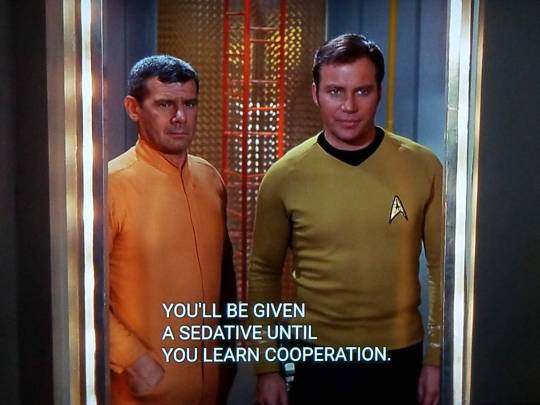
Star Trek
29 notes
·
View notes
Text
“There is a wisdom that is woe; but there is a woe that is madness. And there is a Catskill eagle in some souls that can alike dive down into the blackest gorges, and soar out of them again and become invisible in the sunny spaces. And even if he for ever flies within the gorge, his lowest swoop the mountain eagle is still higher than other birds upon the plain, even though they soar.”
—Herman Melville, Moby-Dick
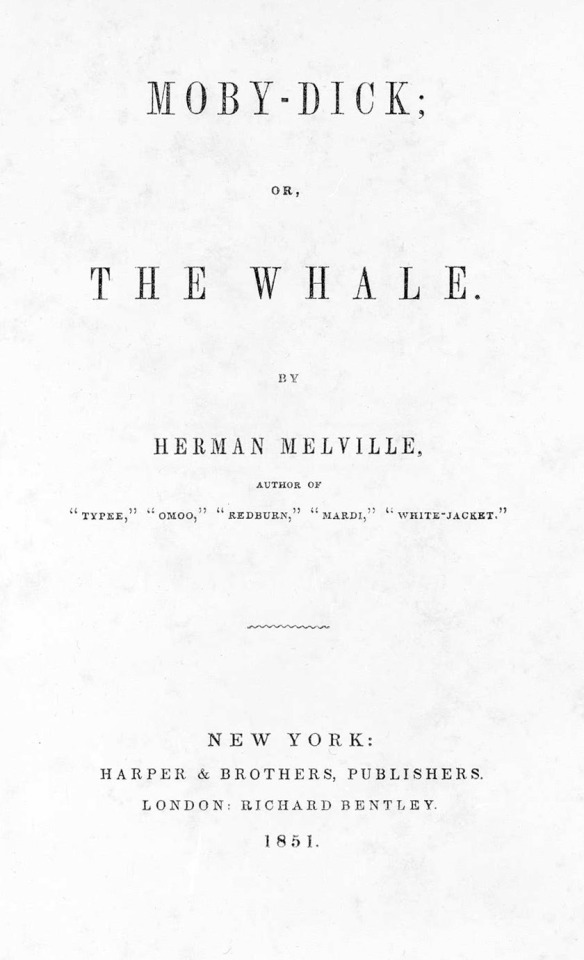
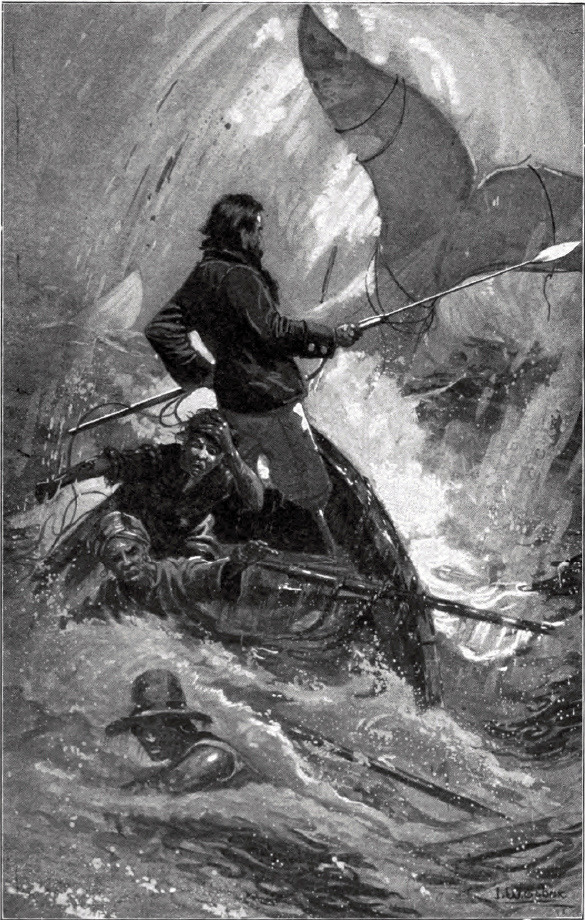
#great lines#great writing#herman melville#moby dick#great stories#western heritage of literature#great writers#19th century literature#wisdom
15 notes
·
View notes